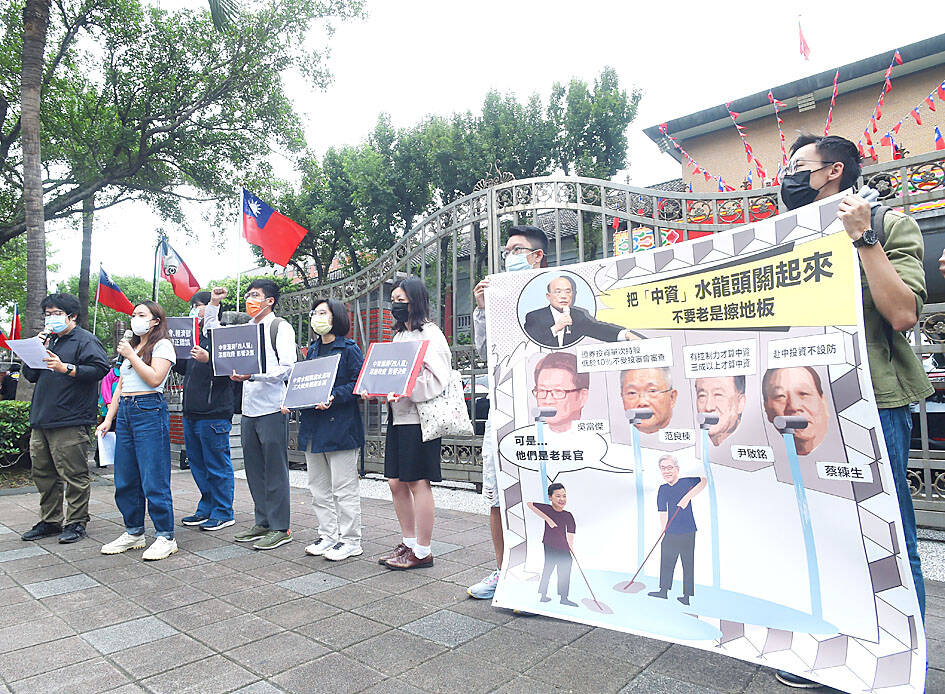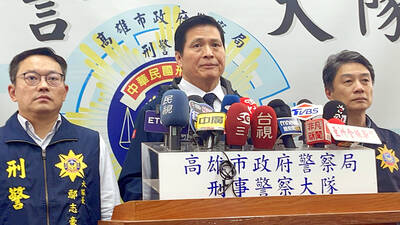The Economic Democracy Union (EDU) yesterday called on the government to tighten financial regulations to stop China increasing its influence through the flow of Chinese capital into Taiwan’s business sector.
Staging a protest in front of the Legislative Yuan in Taipei, attorneys and campaigners from EDU said the problem mainly lies in the pervasive influence of the Ministry of Economic Affairs’ (MOEA) old “Gang of Four” from the past Chinese Nationalist Party (KMT) administration.
EDU convener Lai Chung-chiang (賴中強) pointed to the three major loopholes in approval and oversight mechanisms at the ministry and its agencies.

Photo: Fang Pin-chao, Taipei Times
The first allows overseas investors to continue to trade daily on the Taiwan Stock Exchange without review by the ministry’s Investment Commission, if the purchased amount does not exceed 10 percent of the company’s issued shares, Lai said.
The second allows Chinese investment through a third country if the Chinese shareholding in the overseas company does not exceed 30 percent of the company’s stock, he said.
The third loophole is a lack of prohibitions on the export of semiconductor technology, he said.
Lai and EDU researcher Ou Hsu-shao (歐栩韶) called on the Democratic Progressive Party (DPP) government to patch these “leaking faucets” that allow unmitigated Chinese capital to enter and gain majority control of Taiwan’s business sectors, including semiconductors and information technology.
Premier Su Tseng-chang (蘇貞昌) had used the faucet analogy in March, promising to “turn off” the taps so that water would not overflow, when questioned about a perceived lack of control and oversight of Chinese capital coming into Taiwan.
However, “the economics ministry and its agencies are still full of loopholes, with enforcement lacking and negligence by government officials... The ministry has completely disregarded Premier Su’s promise to fix these leaks,” Ou said.
Lai alleged that it is the MOEA’s old “Gang of Four” and their cabal that are still influencing decisions at the ministry and its agencies, with former economic affairs minister Yiin Chii-ming (尹啟銘) leading the gang.
Appointed by then-president Ma Ying-jeou (馬英九), Yiin headed the ministry from 2008 to 2009, followed by stints as minister without portfolio and head of the Council for Economic Planning and Development from 2012 to 2013.
Lai alleged that the other three were the Ma administration’s Investment Commission executive secretaries Fan Liang-tung (范良棟) and Tsai Lien-sheng (蔡練生), and Financial Supervisory Commission (FSC) vice chairperson Wu Tang-chieh (吳當傑).
“Headed by Yiin, these four figures were in charge of key MOEA policies. Despite the change in government, these four have not really retired, as they continue to play important roles linking businesses between China and Taiwan,” said Lai said, adding that they now serve as executives at China’s Cross-Strait CEO Summit.”
“The other figures took jobs at government-affiliated bodies, from which they continue to exert a lot of influence on the decisions made by the MOEA, the FSC and the Investment Commission. Their power is known to exceed current Minister of Economic Affairs Wang Mei-hua (王美花) and the head of the FSC,” Lai alleged.
“In effect, these four figures and their cabal at MOEA and other government agencies are part of Taiwan’s ‘deep state,’” Laid said, as they work to undermine the DPP government’s economic policies, despite Taiwan’s democratic transformation.

Twenty-four Republican members of the US House of Representatives yesterday introduced a concurrent resolution calling on the US government to abolish the “one China” policy and restore formal diplomatic relations with Taiwan. Led by US representatives Tom Tiffany and Scott Perry, the resolution calls for not only re-establishing formal relations, but also urges the US Trade Representative to negotiate a free-trade agreement (FTA) with Taiwan and for US officials to advocate for Taiwan’s full membership in the UN and other international organizations. In a news release announcing the resolution, Tiffany, who represents a Wisconsin district, called the “one China” policy “outdated, counterproductive

ON PAROLE: The 73-year-old suspect has a criminal record of rape committed when he was serving in the military, as well as robbery and theft, police said The Kaohsiung District Court yesterday approved the detention of a 73-year-old man for allegedly murdering three women. The suspect, surnamed Chang (張), was arrested on Wednesday evening in connection with the death of a 71-year-old woman surnamed Chao (趙). The Kaohsiung City Police Department yesterday also unveiled the identities of two other possible victims in the serial killing case, a 75-year-old woman surnamed Huang (黃), the suspect’s sister-in-law, and a 75-year-old woman surnamed Chang (張), who is not related to the suspect. The case came to light when Chao disappeared after taking the suspect back to his residence on Sunday. Police, upon reviewing CCTV

Johanne Liou (劉喬安), a Taiwanese woman who shot to unwanted fame during the Sunflower movement protests in 2014, was arrested in Boston last month amid US President Donald Trump’s crackdown on illegal immigrants, the Criminal Investigation Bureau (CIB) said yesterday. The arrest of Liou was first made public on the official Web site of US Immigration and Customs Enforcement (ICE) on Tuesday. ICE said Liou was apprehended for overstaying her visa. The Boston Field Office’s Enforcement and Removal Operations (ERO) had arrested Liou, a “fugitive, criminal alien wanted for embezzlement, fraud and drug crimes in Taiwan,” ICE said. Liou was taken into custody

TRUMP ERA: The change has sparked speculation on whether it was related to the new US president’s plan to dismiss more than 1,000 Joe Biden-era appointees The US government has declined to comment on a post that indicated the departure of Laura Rosenberger as chair of the American Institute in Taiwan (AIT). Neither the US Department of State nor the AIT has responded to the Central News Agency’s questions on the matter, after Rosenberger was listed as a former chair on the AIT’s official Web site, with her tenure marked as 2023 to this year. US officials have said previously that they usually do not comment on personnel changes within the government. Rosenberger was appointed head of the AIT in 2023, during the administration of former US president Joe